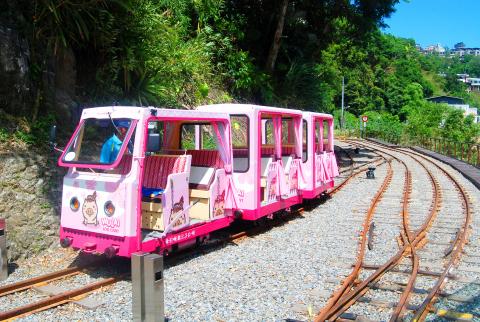A 90-year-old railway in New Taipei City’s Wulai District (烏來) was reopened yesterday after nearly two years of reconstruction following Typhoon Soudelor.
The train’s three carriages transport passengers 1.5km between Wulai Station and Waterfall Station.
There will be a discounted fare of NT$30 until the end of next month.

Photo: Chang An-chiao, Taipei Times
The railway is a landmark of the district along with Wulai Waterfall, Lansheng Bridge and Neidong National Forest Recreation Park, Premier Lin Chuan (林全) said at the reopening ceremony, adding that the area has the potential to become an international tourist attraction.
The originally hand-pulled railway was built in 1928 during the Japanese colonial period to transport logs, tea and passengers, Forestry Bureau Director-General Lin Hua-ching (林華慶) said.
“After the highway was completed in 1951, most sections of the railway were demolished except for the 1.5km portion,” he said.
Typhoon Soudelor in August 2015 caused serious damage to the remaining portion of the railway, 120m of which completely collapsed, he said.
“Much of the reconstruction work was done by hand as big machines could not operate on the narrow roads,” he said, adding that the work was finished last month.
Chu Hung-chi (朱鴻基), who used to pull the carts as a teenager, gave many photographs to a museum by Wulai Station.
Chu said that in the 1960s, he met many tourists from the US who would give him enough tips in a single day to purchase a bag of rice.
His two grandsons said they were glad to see the railway reopen, but expressed hope that the Aboriginal Atayal people’s culture could be featured more in local tourism.
The railway closure dealt a blow to local businesses, a cafe shopkeeper surnamed Lin (林) said, adding that their cafe only barely stayed afloat thanks to some regulars and bicyclists.
“When the typhoon struck, our houses were washed over by mudslides because the bureau did not properly maintain fortifications on the slope,” Lin said, adding that they were still negotiating compensation with bureau officials.

Alain Robert, known as the "French Spider-Man," praised Alex Honnold as exceptionally well-prepared after the US climber completed a free solo ascent of Taipei 101 yesterday. Robert said Honnold's ascent of the 508m-tall skyscraper in just more than one-and-a-half hours without using safety ropes or equipment was a remarkable achievement. "This is my life," he said in an interview conducted in French, adding that he liked the feeling of being "on the edge of danger." The 63-year-old Frenchman climbed Taipei 101 using ropes in December 2004, taking about four hours to reach the top. On a one-to-10 scale of difficulty, Robert said Taipei 101

Nipah virus infection is to be officially listed as a category 5 notifiable infectious disease in Taiwan in March, while clinical treatment guidelines are being formulated, the Centers for Disease Control (CDC) said yesterday. With Nipah infections being reported in other countries and considering its relatively high fatality rate, the centers on Jan. 16 announced that it would be listed as a notifiable infectious disease to bolster the nation’s systematic early warning system and increase public awareness, the CDC said. Bangladesh reported four fatal cases last year in separate districts, with three linked to raw date palm sap consumption, CDC Epidemic Intelligence

Taiwanese and US defense groups are collaborating to introduce deployable, semi-autonomous manufacturing systems for drones and components in a boost to the nation’s supply chain resilience. Taiwan’s G-Tech Optroelectronics Corp subsidiary GTOC and the US’ Aerkomm Inc on Friday announced an agreement with fellow US-based Firestorm Lab to adopt the latter’s xCell, a technology featuring 3D printers fitted in 6.1m container units. The systems enable aerial platforms and parts to be produced in high volumes from dispersed nodes capable of rapid redeployment, to minimize the risk of enemy strikes and to meet field requirements, they said. Firestorm chief technology officer Ian Muceus said

MORE FALL: An investigation into one of Xi’s key cronies, part of a broader ‘anti-corruption’ drive, indicates that he might have a deep distrust in the military, an expert said China’s latest military purge underscores systemic risks in its shift from collective leadership to sole rule under Chinese President Xi Jinping (習近平), and could disrupt its chain of command and military capabilities, a national security official said yesterday. If decisionmaking within the Chinese Communist Party has become “irrational” under one-man rule, the Taiwan Strait and the regional situation must be approached with extreme caution, given unforeseen risks, they added. The anonymous official made the remarks as China’s Central Military Commission Vice Chairman Zhang Youxia (張又俠) and Joint Staff Department Chief of Staff Liu Zhenli (劉振立) were reportedly being investigated for suspected “serious